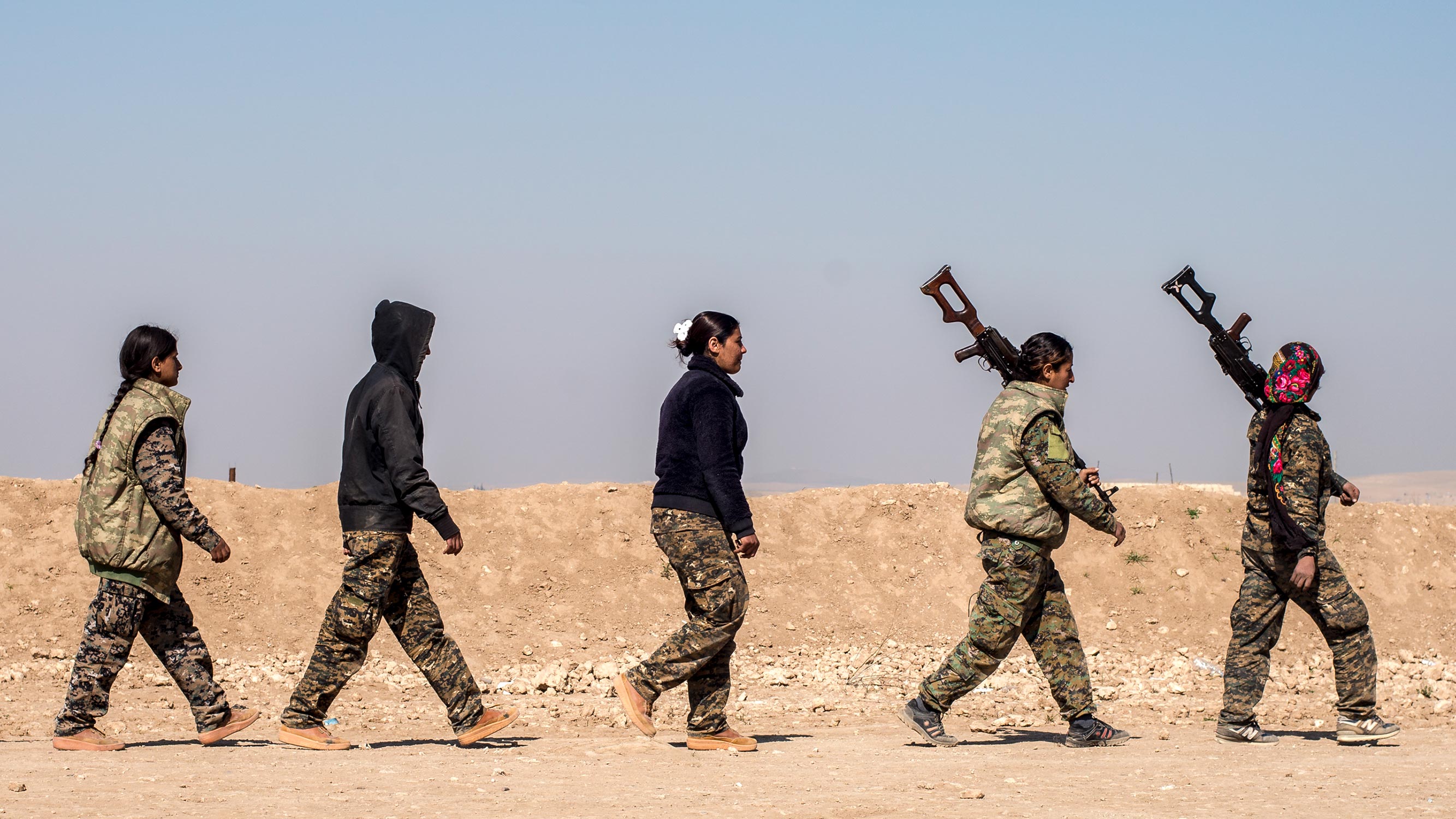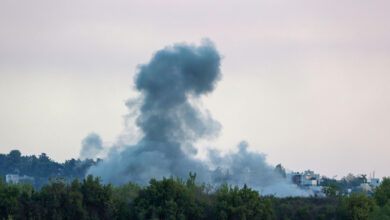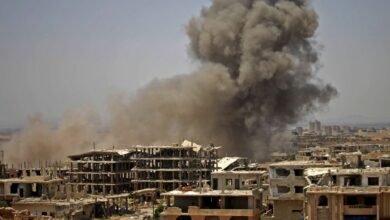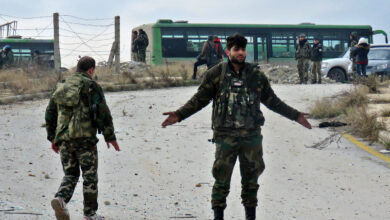‘We have no choice but to liberate Efrin’ – Aldar Xelil on northern Syria’s next moves
Syrian Kurdish leader says his forces are not counting on outside powers to protect them
After returning from the front line of the final battle against ISIS’s caliphate in Baghuz in eastern Syria, Jared Szuba met with senior TEV-DEM foreign affairs official Aldar Xelil in Qamishli, on the border with Turkey. In an exclusive interview for The Defense Post, Xelil described what comes next for the Syrian Democratic Forces and the multi-ethnic political project of North and East Syria, in an area Kurds refer to as Rojava, meaning ‘west’.
The obstacles before them are great. Leaders of the Autonomous Administration of North and East Syria are requesting a seat at the table at the U.N.-backed Geneva peace talks to ensure the survival of their political project. They are seeking international military forces to help maintain security in the fragile province and stave off a potential Turkey-led attack, which they fear will be spearheaded by Islamist Syrian rebels. In the end, they hope for a negotiated settlement with the Assad regime that recognizes their formal autonomy and leads to a politically decentralized and democratic Syria. So far, the international community has offered them no promises.

TDP: The last time we spoke was just days after the announcement about the planned American withdrawal. Can you tell us how the situation has changed since that time?
AX: Internally, not much has changed. We’ve continued with the campaign to defeat ISIS, and we continue to demand what we’ve demanded since 2011 until today, that is, the necessity of a peaceful political settlement to the conflict and the Syrian situation in general. We’ve continued our communications with the Russians to convince them to pressure Damascus to accept dialogue. In addition, we’ve continued developing the autonomous administration system and organizing the councils.
The other thing is that we are adopting measures to address the possible intervention of Turkey. Turkey’s role is always negative, even if they don’t carry out the attack, even if the Americans don’t withdraw, so we always feel the necessity of adopting measures to address the danger posed by Erdogan on our region. All other matters have remained the same – on the contrary, the work rate has increased, especially the civilian and military measures regarding any possible attack.
We are committed. The facts of the matter force us to always adopt our own measures. That is, we won’t depend on an outside power to come and save us. We have to depend on ourselves and take our own precautions.
On the level of diplomatic relations, also, our engagement has continued as it did previously with the Arab nations, with the European nations, with America, towards the goal of arriving at a formula in which north Syria will be protected from Turkey.
Has any group offered help in, for example, helping to defend the border? The Americans are discussing a “safe zone” with Turkey. Are there any developments in that regard? Are you still waiting on the Europeans?
Firstly, the subject of a safe zone is still under discussion. The matter still hasn’t been solved. Mr. James Jeffrey is still communicating with the Turks, and honestly, we don’t know what he is communicating to them regarding an outcome.
But according to our understanding of the matter, he is trying to find a formula that we agree upon for a local force made up of sons of the region, but [one that is] not YPG or YPJ. Of course, the YPG is also local, but [a border force] outside the YPG and YPJ and the Syrian Democratic Forces. A local force will follow.
But this formula constitutes an initial draft for the discussions. I think in the coming days, there will be a meeting between us and Mr. Jeffrey after which we will understand the matter better.

So Jeffrey is seeking local forces for the border zone other than the YPG/J. Has he suggested any specific force for this zone?
No. The matter revolves around a border protection force. Naturally the border protection force will not be YPG. The border protection force will be made up of sons of the region/area. If an agreement is made on this matter, then we can discuss the details. Then the border protection force will be set up alongside it.
We heard something about Ahmed Jarba’s forces, possibly…
No.
Is that not true, or not…?
Not possible.
Why not possible?
Firstly, Jarba doesn’t have the forces. Secondly, for those who liberated and administer this region, Jarba does not have a place in this whole project. Where did this come from? It’s not possible. And also, I think, Turkey will not agree to it [deploying Jarba’s forces]. He’s not a part of this project.
We heard a report a few months ago that the Rojava Peshmerga was another possible force recommended for the border.
The Rojava Peshmerga is a red line. We do not accept them.
For political reasons?
Because Turkey trains them. They received their training from Turkish officers. So how can we trust them? We don’t trust them.
If we go back to the period of 2015, 2016, until 2017, you will find an important role. The Peshmerga in Kurdistan, when they were negotiating their budget with Baghdad, their salaries were interrupted, they weren’t getting their monthly salaries. But the Rojava Peshmerga salaries were not interrupted for a single month, their salaries were always delivered on time, on the very day. Why? Because their salaries were not coming to them from Kurdistan or Baghdad – they were coming from Turkey. That’s why they were not interrupted. It’s a force trained by Turkish officers, and their salaries come from Turkey. It’s not possible for us to trust them.
Firstly, their position is against the project. So they will never protect the project, because they are not convinced of it, fundamentally. And now, they make statements saying, ‘We do not want this project and don’t accept it.’ How can they come and protect the region?
Tell us about your administration’s project. How are they against it? The political project here in Rojava [northern Syria].
They don’t have a specific vision for the project. They oppose the project, but not because they have any specific political vision. Their position depends on Turkey’s position. If Erdogan shifts, then they too will change. Even everyday people, when they offer something, they offer an alternative. They [Rojava Peshmerga] offer, but don’t have an alternative. They offer because Erdogan offers. This is the reason.
The most important thing is, we’re in possession of a democratic project. All of the countries together realize there is no other alternative. Either this project succeeds, or the project of the Muslim Brotherhood, the Islamists, succeeds. And if the Islamists succeed, that’s fertile ground for the rise and growth of ISIS.
If the path is opened for Turkey to launch a strike against this experiment, it will deal a blow to the democratic experiment. And this opens the way for the ideologies of the Brotherhood and the [Syrian] regime to spread. And strengthening of either of these two factions is not in the interest of humanity.
The other matter is that of the ISIS adherents. Currently there are about 70,000 ISIS prisoners present. Their children, after four, five years, will grow up. They could all become suicide bombers and spread all over the world. The women, really, their speech is inflammatory. They speak with conviction, and they are dogmatic in their positions. You saw them.
That’s not to mention the men, the ISIS men. All this is very dangerous. But what we are seeing is that the world is silent. The international community takes no position, not materially, not politically, not legally, not militarily. And this is something bad.

We’ve heard a delegation from your administration just returned from Paris. Is there any news from the Europeans?
The French are affirming they will not give up on northern Syria, and that they will work to support this region and protect it from Turkey. However, between the lines, they are saying, “If America cooperates,” or “if America supports us.” And they say, “We will try to succeed in convincing America to support us.”
Britain also has the same position. They also tie their support to the American position. Of course, if the American position were affirmative, it would enable the Europeans to do something. If it is not affirmative, they [the Europeans] will meet difficulty – it will not enable them to keep their promises, because they [the Americans] won’t have the forces. This is the problem.
Have the Americans told you anything about how long they may stay? We are hearing conflicting reports.
They’re not limiting the time.
But still 400 American soldiers will stay?
This is really something symbolic, if 200, 400, or 4,000 stay. As long as there is the U.S. Army, they will help. If 200 stay, or 2,000, they will defend [the area].
And have the Americans, Jeffrey’s team, mentioned any long-term reassurances? Perhaps the possibility of a formal no-fly zone?
As of yet, they have not promised this.
Why do you think that is?
I mean, Mr. Jeffrey, honestly, his reading of any matter raised always takes Turkey into account. The problem is that viewing this matter from the Turkish angle – or from the angle of appeasing Turkey – will make it more complicated. If he didn’t view this matter from the standpoint of the necessity of satisfying Turkey, he would have taken more preferable steps. And this is a problem.
On the side of discussion with the regime, is there any progress? We heard political and media advisor to Bashar al-Assad Bouthaina Shaaban say there is no possibility of autonomy for the north.
Look, the regime, from 2011 until today, has refused to negotiate or to accept our democratic project. The regime still possesses the old mindset. They are dreaming that they will liberate Idlib and after the Americans exit from this area, will make war on us, and recover all Syrian territories, and rule Syria as they did before 2011. They are still dreaming in this way.
So, as long as they feel they are powerful, and are not in a weak position, they will not agree to dialogue.
When they do indicate readiness to engage in dialogue, it is when they feel that we are weak.
For example in the first days after Trump’s remarks, [the regime] declared, “We are ready for dialogue.” Of course at the same time Erdogan was threatening attacks. Bashar [al-Assad] was thinking we were in a tight position, and we will acquiesce to any of his demands. But then we explained our position to Moscow, and raised the subject in all seriousness and said, “We will not accept anything other than the [full] project.”
If this project is accepted, and negotiated with our brothers in Geneva, maybe we can also agree. But we will not be followers of the regime. We will agree, party-to-party.
When the regime saw our clear position, they did not accept dialogue. And so far they haven’t accepted dialogue.

Is there any news from the Russians? Have they followed up on their offer to support dialogue?
The Russians always are promising, saying, “We are trying to convince the regime, it’s necessary” and so on, but practically speaking, there’s nothing.
What is their position on this?
The Russians agree with Erdogan. And they want to gain his approval for the S-400 missile system, the gas pipeline, a return of relations between Turkey and the regime. And many of the matters – and Idlib – on a number of matters, Russia wants Turkey on its side. Additionally, Russia wants to use Turkey to exploit NATO and the United States. Russia wants to pull Turkey to its side. For all of these reasons, Russia is not ready to irritate Erdogan.
What’s the best outcome for this crisis, in your opinion?
Best outcome? An agreement is necessary for a democratic constitution for all of Syria. And according to that constitution, Syria would be decentralized. There would be autonomous administrations, and there would be a democratic regime. It would involve all groups/sides/parties, and they would be recognized by that constitution. We would agree upon it, and participate in the building of a new Syria, and participate in the defense of Syria against any threat. But this solution, as it stands now, is difficult.
ISIS’s caliphate is finished. What are the next steps for the SDF after Baghouz?
First of all, the military commands have programs for rehabilitation, re-training, and replenishing their forces after their battles. They’ve been at war continuously for a number of years. I think many of them need mental and psychological rest. It’s necessary to re-organize these forces.
Secondly, evaluation of our internal security system, especially with regards to operations against sleeper cells, bombings, IEDs. These threats require a new paradigm. Fighting at the front is different than the internal battle, and this needs work, effort, both military and intelligence.
Can you tell us about the re-training program? The SDF will be re-trained as well?
Yes, SDF. This is an elementary thing. Any military force, after they finish the battle, naturally they pull back to their barracks, treat the wounded, strengthen their groups, convene meetings, organize their affairs, in order to give the fighters a respite, and then transition them to the next phase – these are all natural matters that take place in all armies.

What about operations after Baghuz? Are there any plans for Efrin?
The liberation of Efrin is not connected to Baghuz, it’s a strategy in our view. It’s a goal, not a decision to be made now. Since the invasion, a number of groups remained inside Efrin secretly and they undertake daily military operations, but there is media silence [on this].
But practically, there are always operations [ongoing]. Naturally, we try to benefit from current developments and to develop the operations and accelerate towards the liberation of Efrin.
Liberating Efrin has political, diplomatic, and military aspects. Politically there are communications, diplomatically there are meetings, and militarily there are always preparations. And I think the end of Baghuz and the military victory over ISIS will greatly ease matters regarding Efrin.
Additionally, there are matters that impact the situation in Efrin that aren’t dependent solely on us. For example, the matter of Idlib, affects it. How Idlib will turn out is connected to the positions of Russia, America, the [Syrian] regime, and Turkey. The positions of all of them influence [the situation].
Efrin is surrounded, especially in the areas adjacent to where our forces are present. There are Russian forces and regime forces there. Getting [our forces] to Efrin is difficult. The regime frequently prevents our forces from traveling to Efrin. Russia also prevents it. A few days ago, a number of YPG fighters were martyred in an ambush by the regime, not by Turkey. They give no space for our forces to come and go to Efrin. It seems they want to avoid irritating Turkey, so as to not worsen their relations, so that their previous agreement doesn’t fail.
This is north of Manbij, the Russians are located?
Not only there. Even in the Shahba area. Shahba is connected to Efrin. There are Russian forces between Shahba and Efrin. We know the difficulty of sending fighters and bringing them back. It’s hard in a surrounded region. And it’s mined, all of it.
So there are no plans now to send the SDF to Efrin?
I can’t talk about this matter now, but I want to emphasize one point: We have no choice but to liberate Efrin.
Have you discussed the possibility that a decision to liberate Efrin could complicate the relationship with the Americans?
No, the Americans, regarding the area west of the Euphrates, they didn’t intervene during Turkey’s attack on Efrin. They didn’t take any position. So, it’s not right [for them] to take a position when we want to liberate Efrin. If they get involved, we’ll say, “Why didn’t you get involved when Turkey attacked us?”
America isn’t the one that intervenes. The ones who intervene are Russia and the regime.

If the Americans are negotiating a solution to the border crisis with the Turkish government, if there is a widening of operations to liberate Efrin, would this make James Jeffrey’s work harder?
I did not say we would widen operations. That said, of course, Jeffrey must help with the liberation of Efrin without resorting to [military] operations – [but rather he must] put pressure on Turkey. Turkey doesn’t have the right to come and occupy our territory. Why did they occupy Efrin? There was no terrorism there. There was no conflict there. There were no mercenaries or various armed groups there. There was an administration and all were in agreement. A lot of the displaced Syrians were located in Efrin. Why did Turkey occupy Efrin? This is neither acceptable nor legal. Turkey must get out of Efrin.
A Peshmerga official in Suleimani recently told me that if your forces came under attack by Turkey, they will do their best to assist you with supplies. What’s your reaction to that?
When our Kurdish region is exposed to danger, naturally the different parts of Kurdistan and the Kurds in general, even the Kurds in Europe and abroad, offer support. This position is needed of them.
For example in Kobane, all the Kurds of Kurdistan participated in the Battle of Kobane. In the battle of Efrin, young people from eastern Kurdistan [Iran], from Bakur, the north [Turkey], the south [Iraq], from all regions, even Europe, came to participate in the resistance. They must participate.













